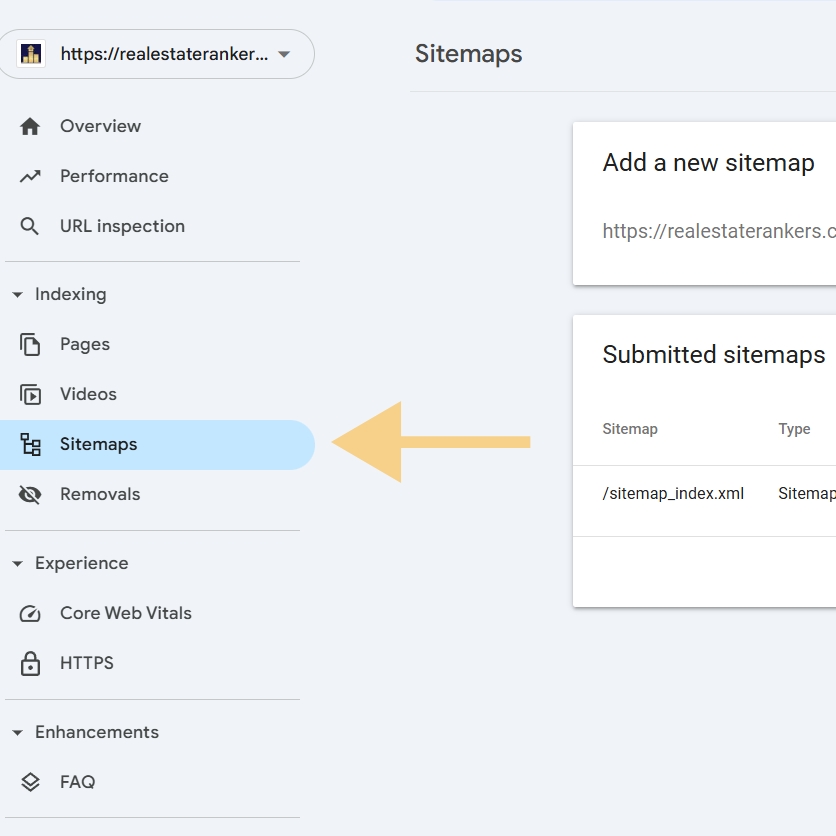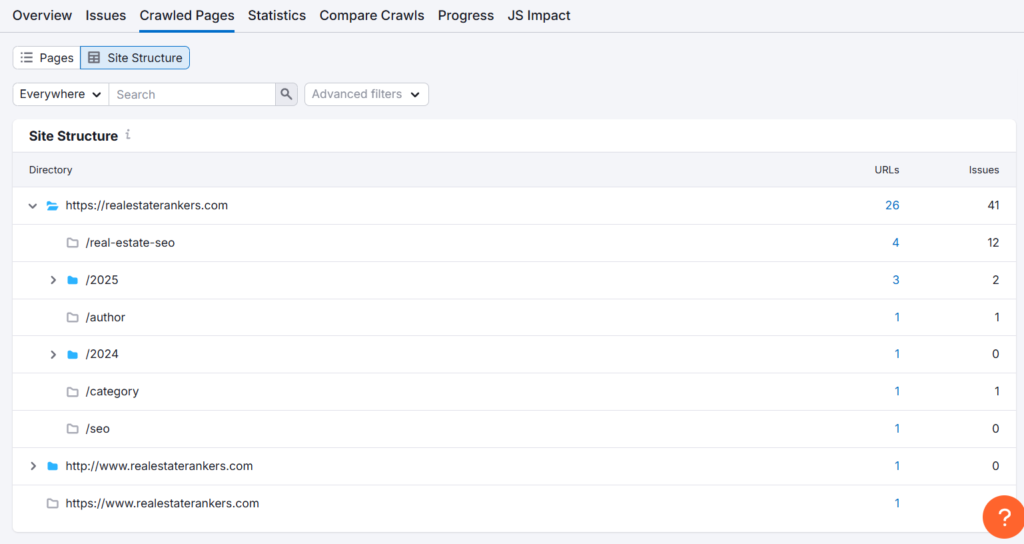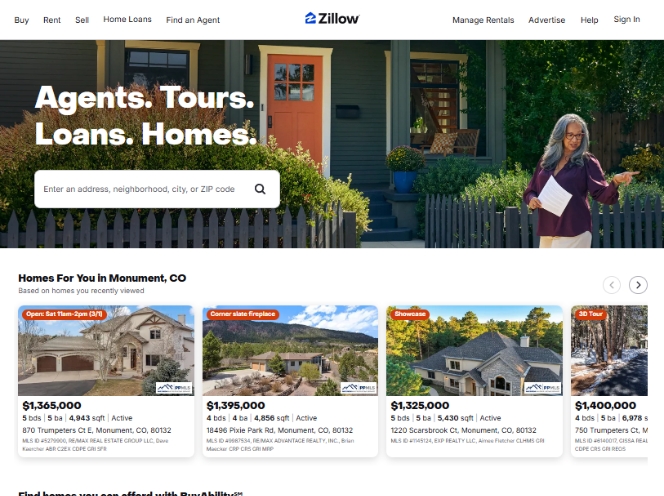Technical SEO for real estate websites is crucial for ensuring your property listings achieve maximum visibility in search results. By optimizing your website to meet search engine standards, you can significantly improve your rankings, attract more potential clients, and stay ahead of competitors in the competitive real estate market.
What is Technical SEO?
Technical SEO involves optimizing a website’s technical aspects to help search engines crawl, index, and render your content more effectively. Unlike on-page SEO, which focuses on content optimization, technical SEO addresses the website’s infrastructure to enhance its visibility and ranking in search results. At Real Estate Rankers, we often explain to our clients, technical SEO forms the foundation upon which all other SEO efforts are built.
Key components include:
- Site security (HTTPS implementation)
- Mobile-friendliness
- Page loading speed
- Efficient crawlability
- Proper indexing
- Effective rendering
- Structured website architecture
For real estate professionals, mastering technical SEO ensures that property listings, neighborhood guides, and service pages are effectively crawled and indexed, significantly boosting visibility to potential clients searching for properties online.
Why is Technical SEO Important for Real Estate Websites?
The real estate industry is highly competitive online, with thousands of agents, brokers, and property management companies vying for visibility. A comprehensive SEO strategy must include technical optimization to stand out from the competition. Our team at Real Estate Rankers has analyzed thousands of real estate websites and found that technical SEO issues are one of the main reasons most real estate sites fail to rank well in competitive markets.
Technical SEO focuses specifically on your website’s underlying structure and performance, ensuring search engines can efficiently crawl and index your content. This directly influences your rankings and ability to attract potential clients.
Benefits for real estate websites include:
- Increased visibility for property listings in local searches
- Higher credibility and trust with potential clients
- Enhanced website performance and user experience
- Better conversion rates for lead generation
- Stronger competitive advantage in your local real estate market
- Reduced bounce rates as users find a smooth, fast experience
- Improved mobile experience for on-the-go property searches
Real estate professionals who invest in technical SEO position themselves as modern, tech-savvy agents who understand the importance of digital presence in today’s market. That’s why Real Estate Rankers offers monthly technical SEO audits as part of of our real estate SEO packages.
How to Improve Your Technical Real Estate SEO
Enhancing your technical SEO involves implementing several essential techniques that work together to improve your website’s performance in search engine rankings.
#1
The Role of XML Sitemaps

An XML sitemap serves as a comprehensive roadmap for search engines, detailing exactly which pages on your website should be crawled and indexed. For real estate websites with numerous property listings that frequently change, sitemaps are particularly important.
Benefits of XML sitemaps for real estate sites:
- Ensures all property listings are discovered and indexed quickly
- Helps search engines understand website structure and hierarchy
- Prioritizes important content like featured properties or neighborhoods
- Facilitates faster indexing of new listings or content updates
- Provides additional metadata about your content
Best practices for real estate XML sitemaps:
- Include all important pages but exclude low-value or duplicate pages
- Update sitemaps automatically when new properties are added
- Submit your sitemap through Google Search Console
- Create separate sitemaps for different content types (properties, blog posts, etc.)
- Keep sitemaps under 50,000 URLs or 50MB for optimal processing
By submitting your XML sitemap through Google Search Console, you can effectively prioritize which pages Google should crawl first, enhancing your site’s visibility and potentially improving rankings for your most important real estate content.
Real Estate Rankers has developed a sitemap optimization process that ensures your most valuable pages get indexed faster, something our clients consistently report leads to faster lead generation.
#2
Optimizing Site Structure

A well-organized site structure is fundamental to both user experience and search engine optimization. For real estate websites that often contain numerous markets across different categories, cities, and communities, logical organization is essential.
A flat, organized site structure, where all pages are only a few clicks away from one another, makes it easier for search engines to crawl the site and for users to find properties quickly. This approach enhances both indexing efficiency and the overall user experience.
Optimal real estate website architecture typically includes:
- Clear hierarchy with main categories (buy, rent, sell, neighborhoods)
- Logical subcategories (property types, price ranges, features)
- Intuitive navigation menus and search functionality
- Internal linking between related properties or neighborhoods
- Breadcrumb navigation for easy movement between levels
Tools like Google Search Console help manage your crawl budget by allowing you to specify which pages are critical and which can be deprioritized, ensuring that your most valuable real estate content gets the attention it deserves from search engines.
#3
Managing Duplicate and Thin Relevant Content
Duplicate and thin content can significantly harm your SEO performance. In real estate websites, this is a common issue due to multiple listing pages with minimal unique content. Many real estate websites often focus solely on displaying homes on their city home search pages without providing additional information, which can lead to missed opportunities for SEO optimization and user engagement.
Canonical tags are a helpful tool used to tell search engines which version of a webpage should be considered the main one when there are similar pages on a website. Imagine you have two similar articles on your site, one under “home buying advice” and another under “first-time buyer tips.” A canonical tag helps you point out which article should be prioritized by search engines, ensuring that the right page appears in search results and preventing any confusion over duplicate content.
Regular SEO audits help identify and manage duplicate content issues, keeping your site optimized and preventing search engine penalties. For real estate sites, this means:
- Using unique descriptions for each page
- Implementing canonical tags for pages appearing in multiple categories
- Creating content-rich community guides instead of thin location pages
- Consolidating similar informational content when appropriate
- Expanding page content with unique features and benefits
Pages that do not add significant value, such as excessive category and tag pages, can use a noindex tag to prevent them from being indexed, maintaining the overall quality of your content and improving rankings for your more important pages.
Partner With
SEO Experts Who Get Results

#4
Enhancing Page Speed to Improve Site Speed for Better SEO
Page speed is a critical factor affecting both user experience and search engine rankings. In the real estate industry, where potential buyers often browse multiple listings quickly, a slow-loading website can significantly increase bounce rates and reduce engagement.
Statistics show that websites loading in under three seconds have significantly higher user retention rates, which is particularly important when showcasing property listings that include multiple high-resolution images.
For real estate websites, page speed optimization brings several benefits:
- Improved user retention and engagement with property listings
- Lower abandonment rates during property searches
- Higher conversion rates for lead generation forms
- Better mobile experience for on-the-go property hunters
- Enhanced search engine rankings, especially for competitive local terms
Investing in technical SEO for page speed improvement often yields a higher return on investment compared to increasing your paid advertising budget, making it an essential strategy for real estate professionals looking to maximize their online marketing efficiency. Real Estate Rankers clients typically see a 30-40% reduction in bounce rates after our page speed optimization services, directly translating to more leads from the same traffic.
Tools to Measure Page Speed
Several tools can help measure and optimize your page speed:
- Google PageSpeed Insights: Analyzes web page content and provides detailed suggestions for making your site faster across both mobile and desktop devices. The tool offers separate scores for mobile and desktop performance, which is crucial for real estate sites that see increasing mobile traffic.
- GTmetrix: Provides comprehensive performance reports including overall performance scores, page details, and specific recommendations for improvement. It’s particularly useful for identifying issues with image sizing that commonly affect real estate sites with numerous property photos.
- BrowserStack SpeedLab: Tests your website across different devices and browsers, ensuring consistent performance for all users regardless of how they access your property listings.
- Lighthouse: Built into Chrome DevTools, this tool provides audits for performance, accessibility, progressive web apps, and more, helping identify specific areas for improvement.
Regular testing with these tools can help identify performance trends and areas needing improvement as your real estate website grows and evolves.
Best Practices for Speed Optimization
To enhance page speed for your real estate website, implement these essential practices:
- Image Optimization: Compress images to reduce load times without compromising visual quality. Consider implementing next-gen formats like WebP for further optimization. For virtual tours and extensive photo galleries, progressive loading can significantly improve perceived performance.
- Lazy Loading: Implement lazy loading for images and videos so that content loads only when it enters the viewport. This is particularly valuable for long property listing pages with multiple high-resolution images and virtual tour videos.
- Browser Caching: Utilize browser caching to store resources locally on users’ devices, speeding up load times for returning visitors who are comparing properties over multiple sessions.
- Minify Code: Reduce file sizes by eliminating unnecessary characters from CSS, HTML, and JavaScript files. For real estate websites with multiple interactive elements like mortgage calculators or map integrations, this can significantly improve performance.
- Reduce HTTP Requests: Combine files where possible and eliminate unnecessary scripts to minimize the number of HTTP requests required to load your page.
- Content Delivery Network (CDN): Implement a CDN to serve your content from servers located closer to your users, reducing latency and improving load times, especially for international property investors.
- Optimize Above-the-Fold Content: Ensure that critical content like property headlines, key features, and primary images load first to improve perceived performance.
- Mobile Optimization: Implement separate mobile-optimized versions of key pages to ensure fast loading on devices with varying connection speeds.
Regular performance auditing should be scheduled to maintain optimal page speed as your real estate website grows and adds more listings and features. Real Estate Rankers offers quarterly performance reviews as part of our monthly packages, ensuring your website maintains optimal speed even as you add new properties and content.
#5
Importance of Structured Data
Structured data through schema markup helps search engines better understand your content, potentially leading to enhanced search results with rich snippets. For real estate websites, this can include property details, pricing information, location data, and availability status directly in search results.
These rich snippets not only attract more clicks than standard links but also pre-qualify visitors by providing detailed information before they click through to your site. Some key structured data types for real estate websites include:
- RealEstateListing schema for property listings
- LocalBusiness schema for agency information
- Person schema for agent profiles
- Review schema for property and agent reviews
- Event schema for open houses and property viewings
- FAQPage schema for common property and neighborhood questions
Implementing proper structured data requires technical expertise but can significantly enhance your visibility in search results and improve click-through rates for your property listings. Real Estate Rankers specializes in implementing real estate-specific schema markup that helps property listings stand out with rich snippets in search results.
#6
Breadcrumbs Navigation
Breadcrumbs help both users and search engines understand a website’s hierarchy. For real estate websites with multiple levels of categorization (e.g., Metro Area > Neighborhood > Property Type > Listings), breadcrumbs provide clear navigation paths that enhance user experience by allowing visitors to easily navigate back to previous pages or category levels.
Not to mention the fact that Google has turned URLs into breadcrumb-style navigation in the search results:

For optimal performance, breadcrumbs should:
- Utilize structured data markup (BreadcrumbList schema)
- Follow a logical hierarchy that matches your site structure
- Use clear, descriptive text for each level
- Be visually distinct but unobtrusive
- Maintain consistency across all pages
Regular auditing of breadcrumb links ensures they accurately reflect your site’s structure and prevent navigation errors that could frustrate potential clients searching for properties.
#7
Mobile Optimization for Real Estate Websites
With Google’s mobile-first indexing, having a mobile-friendly real estate website is no longer optional but essential. Research shows that approximately 72% of homebuyers use mobile devices during their property search process, making mobile optimization critical for reaching potential clients.
Responsive design, which automatically adjusts the layout based on screen size and orientation, ensures that property listings and search functionality work seamlessly across all devices. This approach enhances user engagement and encourages longer browsing sessions.
Key mobile optimization factors for real estate websites include:
- Touch-friendly navigation and search filters
- Fast-loading property images and virtual tours
- Simplified lead capture forms optimized for mobile completion
- Click-to-call functionality for immediate agent contact
- Mobile-optimized map and location features
- Readable text without requiring zoom
- Adequate spacing for touch targets like buttons and links
To ensure a seamless user experience, regularly test your site on various mobile devices and platforms, including both older and newer models with different screen sizes and operating systems. Real Estate Rankers performs cross-device testing across 27 different device configurations to ensure your website delivers a flawless experience to every potential client, regardless of how they access your site.
#8
Technical SEO Audits: Identifying and Fixing Issues
Regular technical SEO audits are essential for identifying and fixing issues that may hinder your site’s performance. For real estate agents that frequently update their website, these audits are particularly important.
Tools like Screaming Frog SEO Spider, SEMrush, and Ahrefs can uncover technical problems such as:
- Broken links to pages that have been removed
- Missing alt attributes on images
- Inadequate or missing meta descriptions for pages
- Duplicate content across similar pages
- Slow-loading pages with excessive image sizes
- Mobile usability issues affecting user experience
- Crawl errors preventing listing indexing
- Redirect chains or loops from updated content
Addressing these issues improves crawl rates and search rankings while ensuring potential clients have a smooth experience browsing your properties. Google Search Console provides additional alerts about indexing errors, enabling timely resolution to ensure all your important property pages are included in search results. Real Estate Rankers’ comprehensive technical audit service identifies up to 200+ potential issues that could be affecting your rankings, with clear prioritization of which fixes will deliver the biggest ranking improvements.
#9
Leveraging Robots Meta Tags and JavaScript
The robots meta tag is a tool that tells search engines how to handle specific pages on your website. By placing these tags in the <head> section of a webpage, you can give clear instructions on whether a page should appear in search results.
For real estate websites, using robots meta tags strategically can help:
- Prevent certain pages from showing up in search results if they contain similar content to other pages
- Decide if certain details, like prices, should be shown in search previews
- Temporarily hide pages that are outdated without deleting them
- Keep private or internal pages, like those for agents or administrative purposes, from being indexed
- Manage which filters or options are visible in search results when users navigate through different sections
The X-Robots-Tag, which can be added to HTTP headers, extends this control to non-webpage files like PDFs of brochures or images, ensuring these resources are managed effectively in search results.
#10
Best Practices for URL Structure
Clean and descriptive URLs help both users and search engines easily understand what a page contains. For real estate websites, logical URL structures improve user experience and can boost SEO performance.
Best practices include:
- Incorporating recognizable words instead of numerical IDs (e.g., /properties/downtown-seattle rather than /properties/id=12345)
- Using hyphens to separate words for improved readability
- Including relevant location information in the URL structure
- Keeping URLs reasonably short while maintaining descriptiveness
- Creating logical hierarchies (e.g., /properties/seattle/downtown/condos)
- Using consistent patterns across similar content types
When URLs contain parameters for filtering properties, use an equal sign to separate key-value pairs and an ampersand for additional parameters (e.g., /properties?location=seattle&min-price=500000&max-price=750000). This approach creates more user-friendly and search engine-friendly URLs for property search results.
#11
Implementing HTTPS for Secure Real Estate Sites
Search engines, particularly Google, prioritize secure websites in their rankings. For real estate businesses that often collect sensitive user information through contact forms and mortgage calculators, transitioning to HTTPS is particularly important.
The padlock symbol displayed in the browser indicates a secure connection, enhancing user trust and reducing bounce rates. This is crucial for real estate websites where users may be hesitant to submit personal information without security assurances.
Transitioning to HTTPS involves:
- Obtaining an SSL/TLS certificate (many hosting providers offer these for free)
- Updating internal links to use HTTPS rather than HTTP
- Implementing 301 redirects from HTTP to secure pages
- Updating references to external resources to use secure connections
- Configuring HSTS (HTTP Strict Transport Security) for maximum security
A secure website not only improves search rankings but also provides a safer environment for potential clients to browse listings and submit inquiries, building trust in your real estate brand. Real Estate Rankers includes free SSL certificate installation and configuration with all of our real estate SEO packages, ensuring your site is secure and trusted by both search engines and potential clients.
Free SEO Audit
#12
Implement hreflang if You Serve Multiple Languages
For real estate agencies serving international clients or operating in multilingual regions, properly set up hreflang tags help search engines interpret the structure of your website and display the appropriate language version to users.
Hreflang tags prevent penalties for duplicate content by clarifying the purpose of different language versions of the same property listings. They enable search engines to display relevant regional or language-specific pages in search results based on the user’s location or language preferences.
The hreflang attribute includes:
- rel=”alternate” indicating an alternate version of the page
- href=”URL” specifying the URL of the alternate version
- hreflang=”language_code” specifying language and optionally country
For real estate businesses targeting international investors, implementing proper hreflang tags can significantly improve targeting and conversion rates by ensuring potential clients see property information in their preferred language.
#13
Check Your Site for Dead Links
Broken links create significant problems for both search engine crawlers and users. They hinder crawlers from properly indexing your site, potentially reducing your website’s rankings as important pages may not get indexed correctly.
For users, dead links negatively impact experience by directing visitors to error pages rather than the property information they seek. Regular automated checks help maintain site integrity and ensure a smooth browsing experience.
Tools like Screaming Frog can identify:
- Links to property listings that have been removed
- Outdated links to neighborhood information
- Broken links to external resources like mortgage calculators
- Internal navigation issues affecting site usability
A broken link checker can also highlight opportunities for link building by identifying non-functional links on external sites that might have previously pointed to your competitors. By reaching out with corrected information, you can potentially gain valuable backlinks to your real estate website.
#14
Noindex Tag and Category Pages
The noindex tag prevents specific web pages from being indexed by search engines, keeping them from appearing in search results while still allowing user access. For websites with numerous filtering options and category pages, strategic use of noindex tags helps eliminate duplicate content issues.
Typical pages to consider for noindex tags include:
- Filtered search results with minimal unique content
- Tag pages
- Outdated but still accessible archives
- Agent login or administrative pages
- Temporary or seasonal property promotion pages
Using noindex on lower-value pages optimizes a site’s crawl budget, ensuring search engines focus on important content like city search pages listings and neighborhood guides. Regular audits of noindex tags prevent important pages from being unintentionally excluded, maintaining effective SEO management.
Avoid Common Technical SEO Mistakes with Real Estate Rankers
Avoiding common technical SEO mistakes prevents significant drops in search engine rankings and ensures continuous visibility for your real estate listings. Real Estate Rankers has rescued dozens of real estate websites from ranking penalties and traffic drops caused by common technical mistakes that often go unnoticed until.
Regular technical audits, attention to detail, and staying current with search engine requirements will help real estate websites avoid these common pitfalls and maintain strong search visibility.
By implementing these technical SEO best practices, real estate professionals can significantly improve their online visibility, attract more qualified leads, and gain a competitive advantage in their local markets. Real Estate Rankers is the premier technical real estate SEO partner for real estate agents and brokerages serious about dominating their local market. Book a call or contact us today for a free technical SEO audit and discover how our specialized services can transform your real estate website’s performance.





